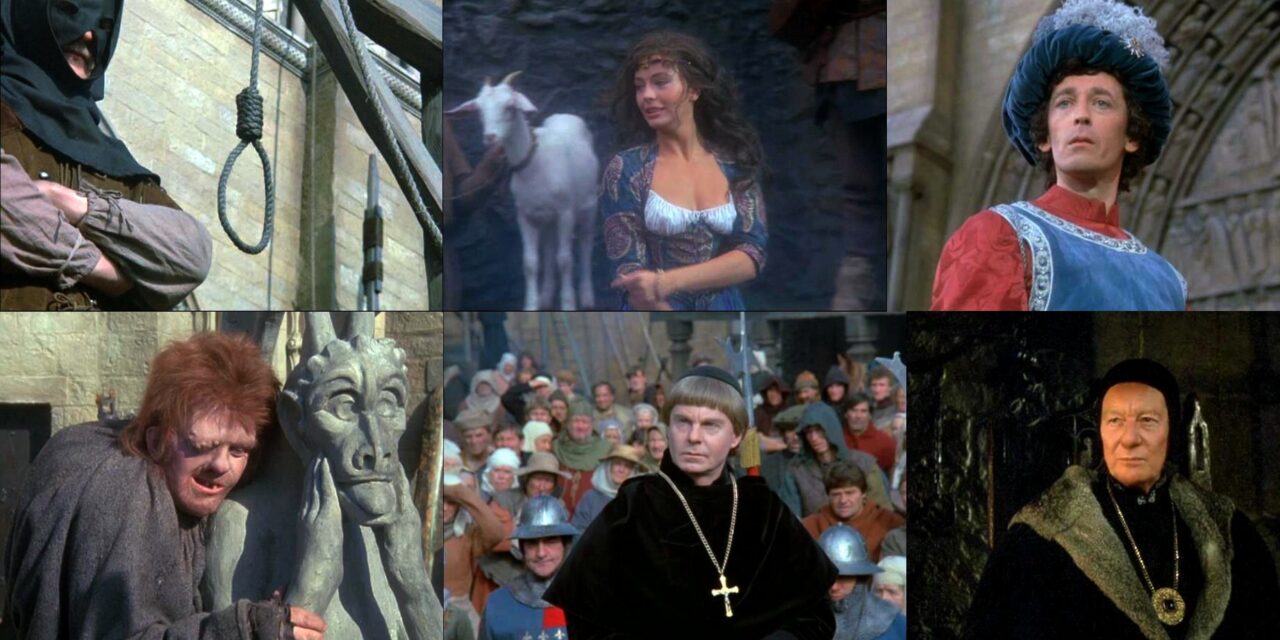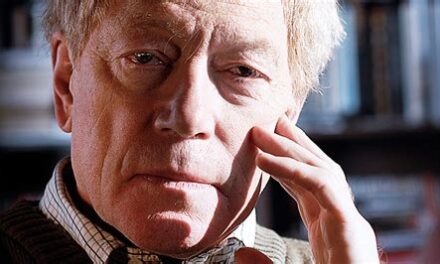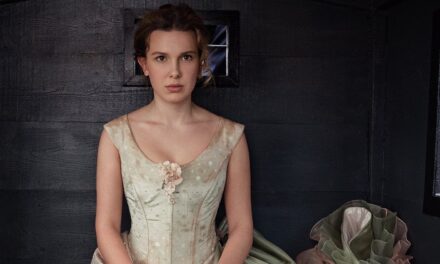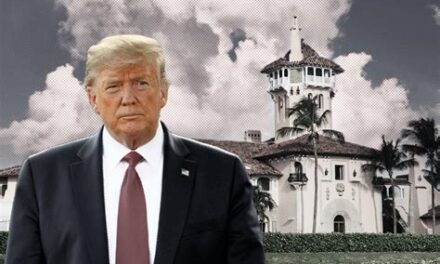The Hunchback of Notre Dame by Michael Turner and Alan Hume is loaded with acting nobility, such as Sir Anthony Hopkins, Sir Derek Jacobi, Sir David Suchet, Sir John Gielgud and Sir Nigel Hawthorne! Other members of the cast may be overlooked but have remarkable backgrounds. Robert Powell was Jesus in Zefferelli’s Jesus of Nazareth. Kenny Baker, the 3-foot-8 midget, was R2-D2 in Star Wars. Hopkins was required to arrive at the set at 3:00 AM because his make-up took five hours!
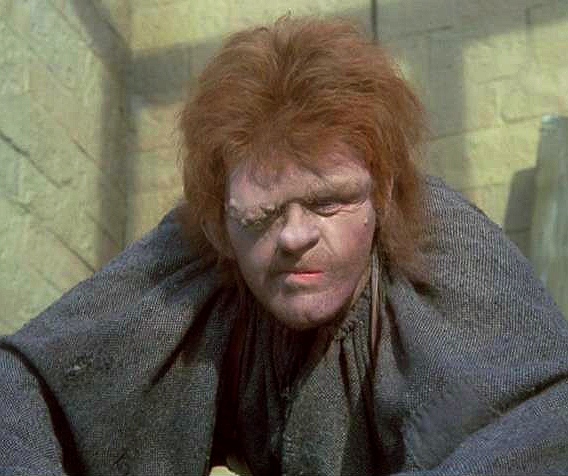 Victor Hugo published the original story in 1831, but it is set in 1482. This version begins with the deformed baby left at Notre Dame and adopted by the cleric, Claude Frollo, who names him Quasimodo because he is an approximation of a human. What is not mentioned is that he was discovered on Quasimodo Sunday, which is now called Mercy Sunday. It was called that because the entrance antiphon in Latin began with Quasi modo geniti infantes. It is based on 1Pt.2:2, “Like newborn babies, crave pure spiritual milk, so that by it you may grow up in your salvation.”
Victor Hugo published the original story in 1831, but it is set in 1482. This version begins with the deformed baby left at Notre Dame and adopted by the cleric, Claude Frollo, who names him Quasimodo because he is an approximation of a human. What is not mentioned is that he was discovered on Quasimodo Sunday, which is now called Mercy Sunday. It was called that because the entrance antiphon in Latin began with Quasi modo geniti infantes. It is based on 1Pt.2:2, “Like newborn babies, crave pure spiritual milk, so that by it you may grow up in your salvation.”
 Suddenly, twenty-five years have passed. Quasimodo is the bell-ringer, but has become deaf as a result. The king declares the Festival of Fools. Frollo, named Archdeacon, meets Esmerelda and is dumbfounded by her beauty. The festival begins in a filthy town square with a smoky atmosphere and poor lighting. The cinematography throughout is poor. Quasimodo is crowned King of the Fools, but Frollo puts an end to the celebration. Esmerelda, on the other hand, is arrested for dancing in the street. Frollo offers her sanctuary in the belltower to avoid the Bastille, but she runs away from his advances. He sends Quasimodo in pursuit, but he is arrested by Captain Phoebus.
Suddenly, twenty-five years have passed. Quasimodo is the bell-ringer, but has become deaf as a result. The king declares the Festival of Fools. Frollo, named Archdeacon, meets Esmerelda and is dumbfounded by her beauty. The festival begins in a filthy town square with a smoky atmosphere and poor lighting. The cinematography throughout is poor. Quasimodo is crowned King of the Fools, but Frollo puts an end to the celebration. Esmerelda, on the other hand, is arrested for dancing in the street. Frollo offers her sanctuary in the belltower to avoid the Bastille, but she runs away from his advances. He sends Quasimodo in pursuit, but he is arrested by Captain Phoebus.
Next, Gringoire, the poet and dramatist, is captured by the gypsies. To save him from execution, Esmerelda chooses to marry him, but she has no desire for him. Meanwhile, Quasimodo is sentence to a public flogging. No one shows him mercy, not even Frollo who caused him to commit a crime, except Esmerelda who quenches his thirst. Anthony Hopkins has little to say, but his skill as an actor is demonstrated by movements and gestures. Quasimodo walks with a limp, which is exacerbated by a very thick sole on his right foot.
 Esmerelda is attracted to Captain Phoebus, who invites her to a room over a tavern. She hopes to be married to him, but learns that he is already married! Frollo, who got news of the rendezvous, stabs Phoebus and flees. Esmerelda is then accused of murder. Subsequently, Derek Jacobi shows his ability to act by his repentance, realizing that he has been bewitched by her beauty. After torture, the gypsy confesses to sorcery and assassination. She is sentenced to be hanged, but in a twist of plot, Phoebus secretly recovers from his wound! Yet, he will not free her. Frollo offers to free her, but his price is immoral. Quasimodo rescues her, however, and gives her sanctuary (for the second time) in Notre Dame. In this version, he does not swing like Tarzan on a rope, but he holds her over his head as Charles Laughton had held Maureen O’Hara in the 1939 version, except the angle of the camera is up, not down toward the vast crowd far below.
Esmerelda is attracted to Captain Phoebus, who invites her to a room over a tavern. She hopes to be married to him, but learns that he is already married! Frollo, who got news of the rendezvous, stabs Phoebus and flees. Esmerelda is then accused of murder. Subsequently, Derek Jacobi shows his ability to act by his repentance, realizing that he has been bewitched by her beauty. After torture, the gypsy confesses to sorcery and assassination. She is sentenced to be hanged, but in a twist of plot, Phoebus secretly recovers from his wound! Yet, he will not free her. Frollo offers to free her, but his price is immoral. Quasimodo rescues her, however, and gives her sanctuary (for the second time) in Notre Dame. In this version, he does not swing like Tarzan on a rope, but he holds her over his head as Charles Laughton had held Maureen O’Hara in the 1939 version, except the angle of the camera is up, not down toward the vast crowd far below.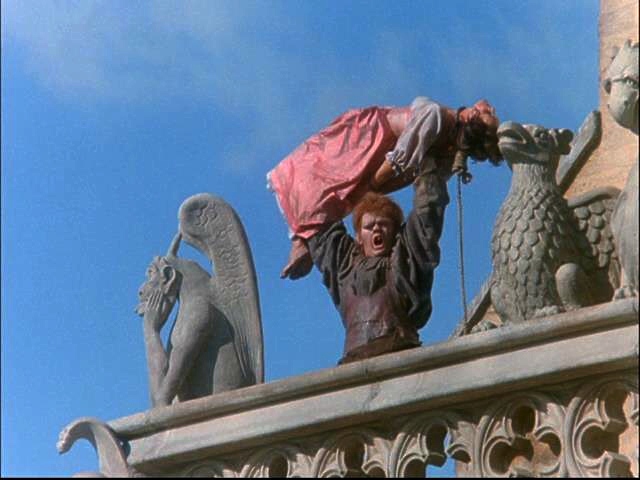
In the tower, Quasimodo and Esmerelda get to know each other. From the dialogue, we finally see how well Hopkins performs. He never realized how ugly he is until he compared himself to her. He tells her that, if she needs him, she ought to ring one of the bells because he can hear them. The unrequited love that he feels breaks his heart. Embracing one of his gargoyle friends, he recites the famous line: Why was I not made of stone like you. The bells are his ladies. They are good for each other.
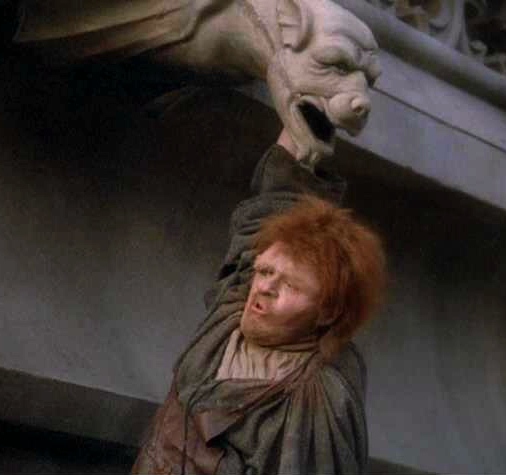 Desperate to save her, Gringoire persuades the king of the gypsies, Clopin Trouillefou, played by David Suchet, to storm the cathedral. Quasimodo thinks that they are coming not to rescue but to kill Esmerelda. He heaves a great beam of timber upon them, but they use it as a battering ram. Next, he tosses heavy blocks of stone and kills a few, including Trouillefou. Frollo ascends the tower to get Esmerelda, but she rings the bell and Quasimodo stops him. In self-defense, he kills his master. By means of scaffolding, Gringoire reaches the tower. Esmerelda now realizes that he was the right man for her. Quasimodo helps them to escape by a secret tunnel, while soldiers pursue the hunchback. With agility on the ropes of the bells, he eludes them. The lesser cleric, Philippe, played by Tim Pigott-Smith, finds Quasimodo hanging from a gargoyle.
Desperate to save her, Gringoire persuades the king of the gypsies, Clopin Trouillefou, played by David Suchet, to storm the cathedral. Quasimodo thinks that they are coming not to rescue but to kill Esmerelda. He heaves a great beam of timber upon them, but they use it as a battering ram. Next, he tosses heavy blocks of stone and kills a few, including Trouillefou. Frollo ascends the tower to get Esmerelda, but she rings the bell and Quasimodo stops him. In self-defense, he kills his master. By means of scaffolding, Gringoire reaches the tower. Esmerelda now realizes that he was the right man for her. Quasimodo helps them to escape by a secret tunnel, while soldiers pursue the hunchback. With agility on the ropes of the bells, he eludes them. The lesser cleric, Philippe, played by Tim Pigott-Smith, finds Quasimodo hanging from a gargoyle.
The ending is a bitter-sweet mixture of liberation and tragedy. We are led to believe, nevertheless, in divine justice and the redemption of the lowly. This is not the best of the Hunchback movies, but it is well done by reason of the superb cast.

